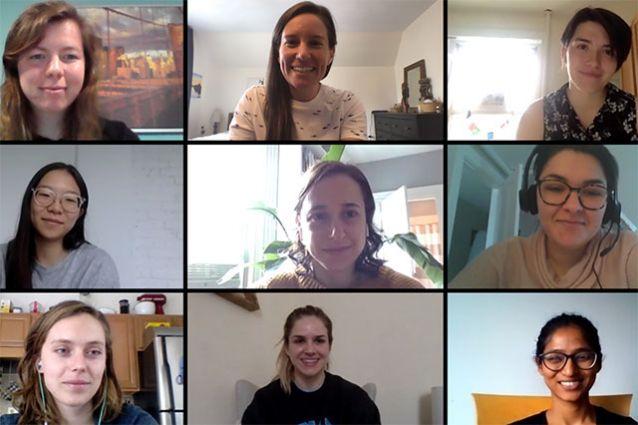-
About
- Departments & Offices
-
Academics
- Physician Assistant
- Special Master’s (MBS)
-
Admissions & Financial Aid
- Tuition & Fees
-
Student Experience
-
- Student Resources by Program
- Academic & Student Support
- Wellness & Wellbeing
- Student Life
- Events & Traditions
-
-
Research
- Research Labs & Centers
- Tufts University-Tufts Medicine Research Enterprise
-
Local & Global Engagement
- Global Health Programs
- Community Engagement
Tufts Students Help Local Health Departments Respond to COVID-19
Whether applying public health lessons or pivoting from nutrition or veterinary research, these students are using their skills to promote safety and awareness in communities

In January, Peilin Wang, MG21, in the Tufts University School of Medicine’s Master of Public Health (MPH) program, decided to spend the semester researching a health topic few people in the United States were concerned about: a virus called COVID-19.
Assigned in a class called Public Health Action, the project called for a presentation of a public health program at the end of the semester. Wang and her classmates planned to propose an educational campaign to raise awareness of the handful of COVID-19 cases in the United States.
Weeks later, after countless updates to their skyrocketing case count, the team narrowed their focus to LA county and started working on a new proposed program for non-medical industries to manufacture personal protective equipment. And a few weeks after that, as businesses shuttered, social distancing advisories went into effect, and the School of Medicine sent students home, Wang found herself staring down the subject of her studies not on a screen, but in the world around her.
“It was heartbreaking to watch things happening. A lot of stuff could have been done, that wasn’t being done,” said Wang, who is concentrating in epidemiology and biostatistics. “The numbers were crazy and I felt really frustrated and powerless.”
Then Wang got a message from Katie Donovan, director of career services for Tufts School of Medicine’s graduate programs. The Academic Health Department Consortium (AHDC), a group of eight public health schools and programs that the Massachusetts Department of Health convened in April 2019, was partnering with local boards of health to respond to the COVID-19 pandemic. Specifically, student volunteers would help with contact tracing—reaching out to those exposed to the virus to identify, contact, and advise those they may have exposed in turn. Would Wang want to sign up?
“The Public Health and Professional Degree Program’s community’s response to the call for volunteers, while heartening, is not a surprise. It's very in line with Tufts’ culture and long history of volunteerism,” said Donovan, who has been serving as the unofficial volunteer point person for the School of Medicine and has funneled dozens of students and alumni into the effort. “This collaboration is definitely a trendsetter and a leader in this country. Other states are reaching out to the schools and the government to figure out, ‘How can we do that?’”
Wang is now one of hundreds of Tufts volunteers who have joined the effort, consisting of mostly public health graduate students, but also including alumni, faculty, and undergraduates studying community health. The state has since shifted contact tracing duty over to the global nonprofit Partners in Health, which aims to bring health care to vulnerable populations, but many student volunteers continue to help health departments in other ways, while others are joining Partners in Health as paid contact tracers. Wang and four other students from the School of Medicine, the Friedman School of Nutrition Science and Policy, and the Cummings School of Veterinary Medicine shared their experiences with Tufts Now.